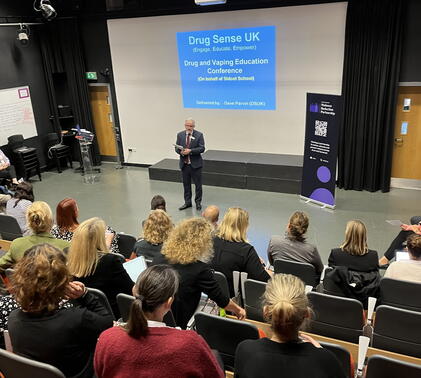
Colleagues from over thirty local state and independent schools were welcomed at Sidcot for our inaugural Education Conference on Vaping and Drugs yesterday.
With vaping ranking high on the news agenda, including indications that single-use (or disposable) vapes may soon be made illegal, delegates heard from three leading experts on the effects of vaping on young people, with a view to safeguarding them.
Dave Parvin from Drug Sense UK spoke passionately about engaging young people and providing practical education on the risks of vaping, seeking to empower young people to make their own decision to hand in their vapes for good.
He addressed some core areas, most notably:
- The highly addictive properties of vaping, especially nicotine, highlighting that a 600ml puff vape is the equivalent of around 20 cigarettes. Dave noted that he regularly meets Year 8 (age 13) students nationally who consume three of these a week. He also noted that 0% nicotine vapes have been shown to contain nicotine.
- The significant other health risks associated with vaping, including a 50% reduction in the ability of the cells to protect our immune system, citing trial evidence from an interview of Dr Aaron Scott, Associate Professor in the Respiratory Science Unit of Birmingham University on the recent BBC Panorama programme. There is also strong evidence to show that the flavourings in drugs contain carcinogens.
Dave also cited some key statistics, including that the number of 11-15 year olds vaping is doubling year-on-year. He also raised the risk of injury, in particular from ‘counterfeit’ vapes, which are likely to be on the rise with the incoming ban on disposable vapes. He talked about the risk of fires and burns from lithium in vapes, or from rechargeable vapes.
Finally, Dave called for parents and schools to “keep the momentum going” and encourage students to come forward for help and support, saying: “I’m sure we can beat this for young people”, through education and support. Schools are encouraged to hold amnesty days for students to hand in their vapes and for all adults to be mindful of the reality of young people being addicted to nicotine. He discussed further routes for support for those addicted, including accessing Nicotine Replacement Therapy (NRT) via medical routes for those over 12. He also noted the increase in SNUS, or nicotine patches, calling for parents and schools to be mindful of their growing use.
The next speaker, Mike Jordan, Police Community Support Officer for the Early Intervention Team – Violence Reduction Partnership at Avon and Somerset Police, spoke about his team’s work as a stepping stone before Operation TOPAZ, the Child Sexual and Criminal Exploitation Team that works predominantly with adults. He provided an understanding of how children are exploited towards dealing drugs and joining County Lines (often by other children), across three stages, including:
- Recruitment – often a grooming process;
- Control – an essential element in the process that establishes dominance of the perpetrator over the victim;
- Exploitation.
Mike encouraged schools and parents to look out for signs that young people are being groomed, including having new groups of friends, using new language, appearing to have new clothes, phones, shoes or cash, skipping school, appearing secretive, displaying behavioural changes, having unexplained injuries.
Mike shared with delegates that grooming can happen to children from all walks of life and all backgrounds and classes, encouraging schools and parents to remove all biases and expectations. He encouraged all agencies to work together to provide ‘more pieces of the puzzle’ to expose exploiters and traffickers. Any concerns can be reported to the police, to help avoid the long term effects of child exploitation (isolation, poor mental health, addiction, unemployment, self-harm, criminal activity and more).
Mike also busted some myths around County Lines, providing intelligence around terminology that is more likely to be heard among young people (‘Going Country’ or ‘Going Long’). He explained that County Lines is not just a drugs issue as it also crosses other crime types, including human trafficking, sexual and physical violence, firearms, and economic crime.
The final speaker was Rhys, a Youth Mentor from Escapeline, which seeks to prevent child exploitation. He spoke powerfully – and incredibly movingly - about his personal experience of being groomed and recruited to County Lines from eight years old, providing an education to all on the realities of the drug world, trap houses and bardos.
The Conference ended with a session for all schools to share best practice and discuss how best to address vaping addiction and to change the societal narrative, including how best to educate and inform students, staff and parents.
Sidcot’s Education Conference on Vaping and Drugs for schools forms part of a sustained safeguarding programme run by Sidcot School, including student assemblies, drop in sessions, and Parent Engagement and Information evenings with Dave Parvin.

